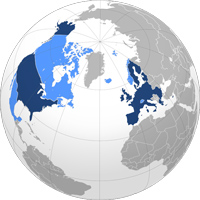Matteo Scarparo, Global Trade Manager for Assocalzaturifici, illustrates and explains the association’s position with respect to the Transatlantic Partnership for Trade and Investments

What is the Assocalzaturifici position towards TTIP?
«The Association is 100% in favor of the agreement and no problems which could make it harmful or uninteresting for the Italian footwear industry have been found. There is no reason to fear a strong imports increase from the United States, for example. The American brands, usually players who far-back operate worldwide, are already present in our country and they already do not undergo special penalties during export. Thus, the situation would not change much for them».
What about Italian producers?
«For us, the American market is the third largest one and, as such, it is significantly important, also because, in recent years, it is again growing substantially. However, it remains a market penetrable with difficulty. Our sector, in fact, and more generally the house/person segment, is among the most hardly hit by customs duties. In other words, we are the ones who globally contribute to enrich more than anybody else the coffers of US customs, those who suffer the greatest load of customs tariffs. Tariffs which are not very high per se, about 11%, reaching the highest peaks for some product codes, but which, anyway, exceed the average considered “normal”, that is between 4 and 8%. For this reason, an agreement capable to provide for the reduction of duties is crucial. In addition, other equally problematic aspects could be overcome, such as non-tariff barriers: in fact, the agreement provides for harmonized regulatory standards. Today our companies spend time and resources to make their productions compatible with the US standards. The import in the USA, at the moment, can only take place through the register of import licenses which is not at all simple to prepare. Furthermore, it is necessary to complete a series of other very complex documents. Thus, the US market is a very interesting one, but, till now, only for companies with a strong structure, able to fulfill all of these practices. The agreement could open the doors of the country to medium/small shoe factories that have good products and excellent potential».
Some fear that the product safety standards can be lower as a result of the agreement?
«No, it will not happen. The various regulations may be simplified at a bureaucratic level, but US standards are still high for what concerns safety of footwear products».
Should other people be frightened by the ease with which foreign investors can acquire small/medium enterprises, which are the backbone of our manufacturing system?
«So much the better foreign investments. We think it is not a problem at all. Moreover, in the draft of the treaty, there is a chapter devoted precisely to SMEs, where we introduce safeguard clauses against malevolent acquisitions and operations».
What effects could the agreement have on the issue of mandatory labelling?
«No one directly. Indirectly, in order to access the facilities provided by the Treaty, it would be needed, of course, a demonstration of the European origin of the product. On this subject, the European footwear associations have submitted a request to the USA to soften its regulations regarding the allocation of origin of the shoe, which, at the moment, considers the upper to be processed in the country of origin. This rule would cut off many European companies that work the upper in non-EU nations, even though they assemble the models and do the making with value added in Europe».
What impact would TTIP have on Italian exports?
«With the same geo-political conditions we could definitely see a significant exports increase, almost by 10%, towards the whole area involved in the treaty. But going through with the agreement would also have a less obvious impact, even if equally important. The USA have virtually gone through with a similar agreement with 11 countries of the Pacific region (TTP), including, for example, Japan, Vietnam, Malaysia, Mexico… These countries would have a facilitated access to the American market, while we, by not closing the agreement, would be consequently penalized».
Are there some points still to be improved?
«The one related to public supplies, which could prove to be very interesting for our industry. At the moment, the USA still maintain the “Buy America”, that is privileged conditions for American companies that take the wind out of foreign suppliers’ sails… If this were abolished and equal conditions of access to contracts were ensured, interesting opportunities could be freed».  What is TTIP? The Transatlantic Trade and Investment Partnership (TTIP), initially known as transatlantic free trade area, is a commercial free trade agreement that since 2013 exists between the European Union and the Unites States of America.
What is TTIP? The Transatlantic Trade and Investment Partnership (TTIP), initially known as transatlantic free trade area, is a commercial free trade agreement that since 2013 exists between the European Union and the Unites States of America.
The declared aim is to integrate the two markets, lowering customs duties and removing a wide range of areas of non-tariff barriers, that is the differences in technical regulations, norms and approval procedures, standards applied to the products, sanitary and phytosanitary rules. This would make the free movement of goods possible, the flow of investment facilitated and the access to their respective services markets and public procurement allowed.
If the project goes ahead, it would create the largest area of existing free trade, since the EU and USA account for about half of the global GDP and one-third of global trade.
(source Wikipedia)
Hurry up for TTIP
On June 8, three category associations, of US and Europe, signed a document that sounds like a call to break down, as soon as possible, both tariff and non-tariff barriers between the two countries The three associations of reference for the US and European footwear world (the European Confederation CEC – whose president is Cleto Sagripanti, the American Apparel & Footwear Association AAFA – whose president and CEO is Rick Helfenbein, and the US Association of FDRA retailers – whose president is Matt Priest) have signed a joint document with the aim of pressuring the US and EU institutions to unblock negotiations and carry through with the approval path for TTIP (Trans-Atlantic Trade and Investment Partnership). The goal is clear and simple: destroying any tariff barrier.
«Harmonizing standards and regulations affecting the footwear trade in the USA and EU and eliminating customs tariffs will reduce costs and will bring benefits to producers and consumers»
4 questions to Cleto Sagripanti, president of the European Footwear Confederation
What are the TTIP advantages for the European footwear industry?
«Trade liberalization, as wished for in the document signed between the CEC, AAFA and FDRA on the last June 8 in New York, should lead to duty cancellation by 10% on Italian footwear export to the USA. This is undoubtedly the main purpose and benefit»
Are there any points of the treaty that could penalize the European SMEs/shoe factory?
«Till now, there are not penalizing points we are aware of, given that Europe at the moment is already the most open market in the world, at least for what concerns footwear. Those who are worried about the possibility of lower safety, health and social equity standards, should modify their point of views and feel reassured by the fact that two such important commercial realities share the same rules in a clear and unequivocal way»
Could TTIP help the European path towards mandatory labelling?
«Definitely it will not hinder it, given that American consumers care about the Made in Italy more than Italians themselves do»
Why could TTIP prove to be a strategic agreement?
«After the end of the period of the anti-dumping duties (unfortunately not replicable), Europe is the most open market in the world with regard to footwear. Considering the lobby adversity of the northern European countries about a minimum of protection, we need to facilitate access to non-European markets, in particular to Asian and Mercosur (South America) markets»
Latest news
On 28 August, German Vice-Chancellor and Economy Minister, Sigmar Gabriel released a statement, declaring, although unofficially, the failure of negotiations between the United States and the European Union on the Transatlantic Trade and Investment Partnership (TTIP). Gabriel pointed out that in 14 rounds of talks, the parties haven’t reached an agreement on a single common item out of 27 chapters being discussed.



